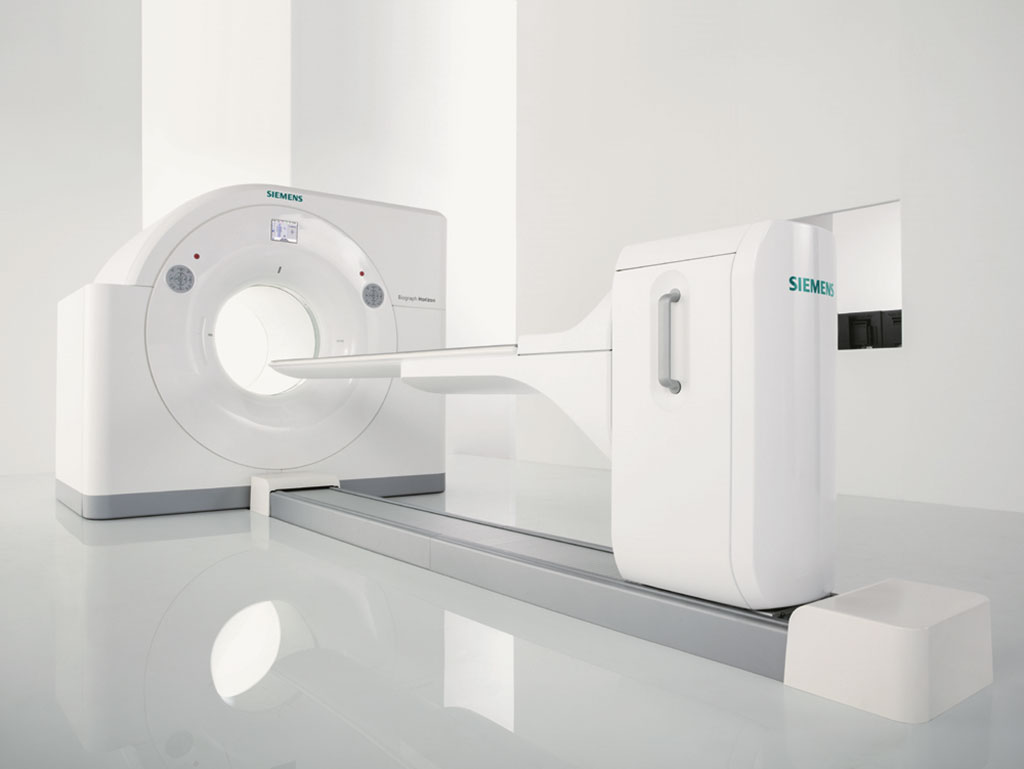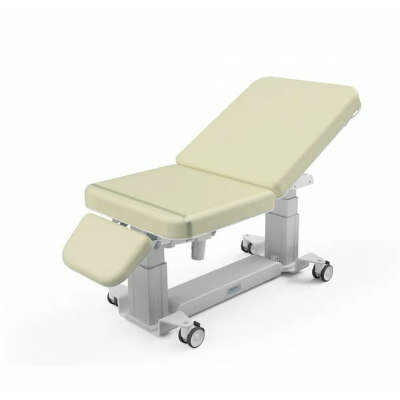Molecular Imaging Transforms Prostate Cancer Management
|
By MedImaging International staff writers Posted on 02 Apr 2020 |

Image: The Siemens Healthineers Biograph Horizon PET/CT (Photo courtesy of Siemens Healthineers)
Prostate-specific membrane antigen (PSMA) positron emission tomography computed tomography (PET-CT) improves prostate cancer staging accuracy, claims a new study.
Researchers at the University of Melbourne (UNIMELB; Melbourne, Australia), the University of Western Australia (UWA; Crawley, Australia), and other institutions conducted a study involving 300 men at ten sites across Australia diagnosed with prostate cancer and deemed to be at high risk. The men were randomly assigned to receive either conventional CT and bone scans (152 patients) or PSMA-PET/CT (148 patients). The CT produces detailed body images, while the PET scan detects areas where PSMA is present at high levels, indicating the presence of prostate cancer cells.
The results showed that PSMA-PET/CT scans were much more accurate (92%) than conventional CT and bone scans (65%) at detecting cancer spread. Conventional imaging failed to detect cancer spread in 29 patients, giving a false negative result. By comparison, PSMA-PET/CT gave false negative results in just six patients; furthermore, fewer men had false positive results. While both imaging techniques involved radiation exposure, the dose associated with PSMA-PET/CT was less than half (8.4mSv) of conventional imaging (19.2mSv).
In addition, PSMA-PET/CT scans had greater impact on the way the patients' disease was managed, with 28% having their treatment plans changed following scans, compared with 15% following conventional imaging. And when PSMA-PET/CT was introduced at the second round of imaging (after conventional imaging), disease management plans were still changed in 27% of cases, but when conventional imaging was used at the second round, however, just 5% of patients had their treatment plans changed. The study was published on March 20, 2020, in The Lancet.
“Taken together, our findings indicate that PSMA-PET/CT scans offer greater accuracy than conventional imaging and can better inform treatment decisions,” said lead author Professor Michael Hofman, MBBS, of the Peter MacCallum Cancer Centre at UNIMELB. “We recommend that clinical guidelines should be updated to include PSMA PET/CT as part of the diagnostic pathway for men with high risk prostate cancer.”
PET is a nuclear medicine imaging technique that produces a three dimensional (3D) image of functional processes in the body. The system detects pairs of gamma rays emitted indirectly by a positron-emitting radionuclide tracer. Tracer concentrations within the body are then reconstructed in 3D by computer analysis. In modern PET-CT scanners, 3D imaging is often accomplished with the aid of a CT X-ray scan performed on the patient during the same session, in the same machine.
Related Links:
University of Melbourne
University of Western Australia
Researchers at the University of Melbourne (UNIMELB; Melbourne, Australia), the University of Western Australia (UWA; Crawley, Australia), and other institutions conducted a study involving 300 men at ten sites across Australia diagnosed with prostate cancer and deemed to be at high risk. The men were randomly assigned to receive either conventional CT and bone scans (152 patients) or PSMA-PET/CT (148 patients). The CT produces detailed body images, while the PET scan detects areas where PSMA is present at high levels, indicating the presence of prostate cancer cells.
The results showed that PSMA-PET/CT scans were much more accurate (92%) than conventional CT and bone scans (65%) at detecting cancer spread. Conventional imaging failed to detect cancer spread in 29 patients, giving a false negative result. By comparison, PSMA-PET/CT gave false negative results in just six patients; furthermore, fewer men had false positive results. While both imaging techniques involved radiation exposure, the dose associated with PSMA-PET/CT was less than half (8.4mSv) of conventional imaging (19.2mSv).
In addition, PSMA-PET/CT scans had greater impact on the way the patients' disease was managed, with 28% having their treatment plans changed following scans, compared with 15% following conventional imaging. And when PSMA-PET/CT was introduced at the second round of imaging (after conventional imaging), disease management plans were still changed in 27% of cases, but when conventional imaging was used at the second round, however, just 5% of patients had their treatment plans changed. The study was published on March 20, 2020, in The Lancet.
“Taken together, our findings indicate that PSMA-PET/CT scans offer greater accuracy than conventional imaging and can better inform treatment decisions,” said lead author Professor Michael Hofman, MBBS, of the Peter MacCallum Cancer Centre at UNIMELB. “We recommend that clinical guidelines should be updated to include PSMA PET/CT as part of the diagnostic pathway for men with high risk prostate cancer.”
PET is a nuclear medicine imaging technique that produces a three dimensional (3D) image of functional processes in the body. The system detects pairs of gamma rays emitted indirectly by a positron-emitting radionuclide tracer. Tracer concentrations within the body are then reconstructed in 3D by computer analysis. In modern PET-CT scanners, 3D imaging is often accomplished with the aid of a CT X-ray scan performed on the patient during the same session, in the same machine.
Related Links:
University of Melbourne
University of Western Australia
Latest General/Advanced Imaging News
- Bone Density Test Uses Existing CT Images to Predict Fractures
- AI Predicts Cardiac Risk and Mortality from Routine Chest CT Scans
- Radiation Therapy Computed Tomography Solution Boosts Imaging Accuracy
- PET Scans Reveal Hidden Inflammation in Multiple Sclerosis Patients
- Artificial Intelligence Evaluates Cardiovascular Risk from CT Scans
- New AI Method Captures Uncertainty in Medical Images
- CT Coronary Angiography Reduces Need for Invasive Tests to Diagnose Coronary Artery Disease
- Novel Blood Test Could Reduce Need for PET Imaging of Patients with Alzheimer’s
- CT-Based Deep Learning Algorithm Accurately Differentiates Benign From Malignant Vertebral Fractures
- Minimally Invasive Procedure Could Help Patients Avoid Thyroid Surgery
- Self-Driving Mobile C-Arm Reduces Imaging Time during Surgery
- AR Application Turns Medical Scans Into Holograms for Assistance in Surgical Planning
- Imaging Technology Provides Ground-Breaking New Approach for Diagnosing and Treating Bowel Cancer
- CT Coronary Calcium Scoring Predicts Heart Attacks and Strokes
- AI Model Detects 90% of Lymphatic Cancer Cases from PET and CT Images
- Breakthrough Technology Revolutionizes Breast Imaging
Channels
Radiography
view channel
Novel Breast Imaging System Proves As Effective As Mammography
Breast cancer remains the most frequently diagnosed cancer among women. It is projected that one in eight women will be diagnosed with breast cancer during her lifetime, and one in 42 women who turn 50... Read more
AI Assistance Improves Breast-Cancer Screening by Reducing False Positives
Radiologists typically detect one case of cancer for every 200 mammograms reviewed. However, these evaluations often result in false positives, leading to unnecessary patient recalls for additional testing,... Read moreMRI
view channel
Low-Cost Whole-Body MRI Device Combined with AI Generates High-Quality Results
Magnetic Resonance Imaging (MRI) has significantly transformed healthcare, providing a noninvasive, radiation-free method for detailed imaging. It is especially promising for the future of medical diagnosis... Read more
World's First Whole-Body Ultra-High Field MRI Officially Comes To Market
The world's first whole-body ultra-high field (UHF) MRI has officially come to market, marking a remarkable advancement in diagnostic radiology. United Imaging (Shanghai, China) has secured clearance from the U.... Read moreUltrasound
view channel.jpg)
Diagnostic System Automatically Analyzes TTE Images to Identify Congenital Heart Disease
Congenital heart disease (CHD) is one of the most prevalent congenital anomalies worldwide, presenting substantial health and financial challenges for affected patients. Early detection and treatment of... Read more
Super-Resolution Imaging Technique Could Improve Evaluation of Cardiac Conditions
The heart depends on efficient blood circulation to pump blood throughout the body, delivering oxygen to tissues and removing carbon dioxide and waste. Yet, when heart vessels are damaged, it can disrupt... Read more
First AI-Powered POC Ultrasound Diagnostic Solution Helps Prioritize Cases Based On Severity
Ultrasound scans are essential for identifying and diagnosing various medical conditions, but often, patients must wait weeks or months for results due to a shortage of qualified medical professionals... Read moreNuclear Medicine
view channel
New PET Biomarker Predicts Success of Immune Checkpoint Blockade Therapy
Immunotherapies, such as immune checkpoint blockade (ICB), have shown promising clinical results in treating melanoma, non-small cell lung cancer, and other tumor types. However, the effectiveness of these... Read moreNew PET Agent Rapidly and Accurately Visualizes Lesions in Clear Cell Renal Cell Carcinoma Patients
Clear cell renal cell cancer (ccRCC) represents 70-80% of renal cell carcinoma cases. While localized disease can be effectively treated with surgery and ablative therapies, one-third of patients either... Read more
New Imaging Technique Monitors Inflammation Disorders without Radiation Exposure
Imaging inflammation using traditional radiological techniques presents significant challenges, including radiation exposure, poor image quality, high costs, and invasive procedures. Now, new contrast... Read more
New SPECT/CT Technique Could Change Imaging Practices and Increase Patient Access
The development of lead-212 (212Pb)-PSMA–based targeted alpha therapy (TAT) is garnering significant interest in treating patients with metastatic castration-resistant prostate cancer. The imaging of 212Pb,... Read moreImaging IT
view channel
New Google Cloud Medical Imaging Suite Makes Imaging Healthcare Data More Accessible
Medical imaging is a critical tool used to diagnose patients, and there are billions of medical images scanned globally each year. Imaging data accounts for about 90% of all healthcare data1 and, until... Read more
Global AI in Medical Diagnostics Market to Be Driven by Demand for Image Recognition in Radiology
The global artificial intelligence (AI) in medical diagnostics market is expanding with early disease detection being one of its key applications and image recognition becoming a compelling consumer proposition... Read moreIndustry News
view channel
Hologic Acquires UK-Based Breast Surgical Guidance Company Endomagnetics Ltd.
Hologic, Inc. (Marlborough, MA, USA) has entered into a definitive agreement to acquire Endomagnetics Ltd. (Cambridge, UK), a privately held developer of breast cancer surgery technologies, for approximately... Read more
Bayer and Google Partner on New AI Product for Radiologists
Medical imaging data comprises around 90% of all healthcare data, and it is a highly complex and rich clinical data modality and serves as a vital tool for diagnosing patients. Each year, billions of medical... Read more



















